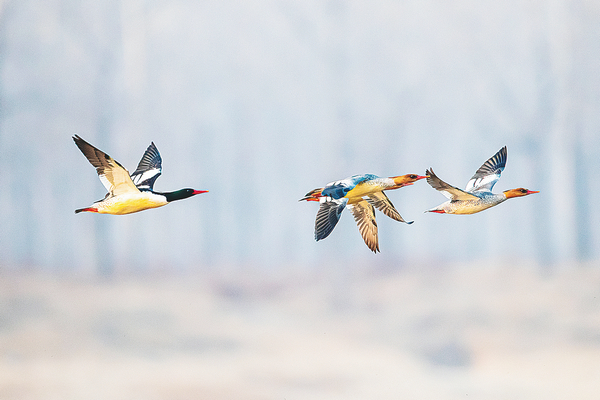Beijing wetland welcomes rare 'living fossils'


Floating on a reservoir in Pinggu, northeast of Beijing, two couples of Chinese mergansers have become the latest proof of continuous local efforts in ecological protection.
The drake of the Chinese merganser wears long crown feathers and has prominent scaly patterns on both sides, a reason that the species is also known as the "scaly-sided merganser", while the hen wears a gray, scaly pattern on her back, darker colors on both sides and long crown feathers of reddish-brown.
This beautiful and rare waterfowl has been living on the planet for over 10 million years, hence its nickname "a living fossil with wings". It is an indicative species of the wetlands' ecological health. At present, it is estimated that no more than 3,000 wild specimens of this bird are left in the world. It has been on the Red List of Threatened Species of the International Union for Conservation of Nature, and it's also under first-grade state protection in China. Its name is defined by location.
According to Jin Haiqing, wildlife monitor of Xiyu Reservoir with the Landscaping Bureau of Pinggu District, on the morning of March 8, some local bird watchers witnessed a merganser duck with extraordinary features. After being verified by the experts, two pairs of Chinese mergansers (Mergus squamatus) had been spotted at the reservoir.
Curiously, though, while the Chinese mergansers follow a flock of ordinary mergansers during their migrations, they usually do not mix with, and stay apart from, the others, observed Jin, who said that, at the reservoir, their food, like that of other waterfowl, is small fish and loach.
Beijing is positioned at a key point along the East Asian-Australasian Flyway, the longest flyway for migratory birds in the world, thus it is a key resort for these winged travelers to rest and feed. In recent years, thanks to the tireless efforts in strengthening ecological protection, the environment around the wetlands has been improving, and a greater number of bird species have been observed around the city.
Experts pointed out that the arrival of these rare ducks was the result of effectively protecting the original wilderness of the wetland around the reservoir, and taking effective measures to prevent poaching, electrofishing, and other illegal acts that may very likely harm the wildlife.
The local government of Pinggu adopted the concept of "maintaining the original ecology" for the reservoir wetlands, setting up fences to prevent poaching and other activities that may cause severe damage to the biosphere, and deploying local monitors to track and register biodiversity at important sites, says Zhang Yufang, deputy director of the Forest Chief System Office and deputy director of the Landscaping Bureau in Pinggu District.
On March 13, Zhang and staff with the bureau came to Xiyu Reservoir for an inspection. He said that in order to protect the birds that pass through the region, the bureau has also stepped up the monitoring and inspection of poaching and other illegal activities.
Over the past weekend, more than 100 bird-watchers and photography enthusiasts rushed to the site to see the Chinese mergansers, Jin says. In order to keep the birds from being disturbed, local bird lovers also organized WeChat groups, calling on everyone to watch and photograph birds in a respectful manner, he says.
Peng Yuzhong, a local bird watcher and photographer, was the first one to recognize the Chinese mergansers at the reservoir. He and his wife have been visiting to observe the avian wildlife on a daily basis since the migration season began. He believes that the nearly intact state of the reservoir wetland attracts the Chinese mergansers.
"To protect the environment is for humanity to coexist in harmony with Mother Nature," he says.
If the intact ecosystem of the wetlands is to be better protected and restored gradually, it can be expected that even more species are likely to make an appearance in the city, according to the experts.
Xinhua



































